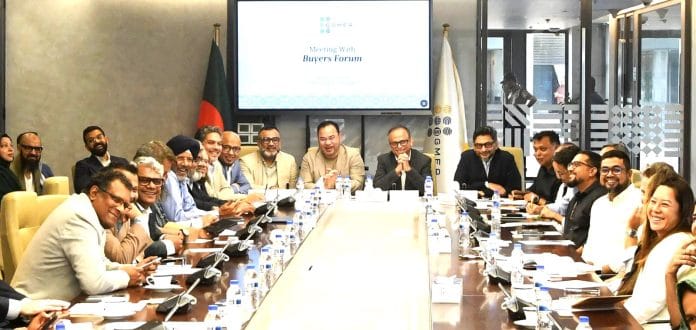In a bid to strengthen sustainable supply chains in the global fashion industry, representatives of major international brands and leaders of the Bangladesh Garment Manufacturers and Exporters Association (BGMEA) met at the BGMEA Complex in Uttara on Wednesday. The high-level meeting focused on partnership strategies to shape the future of the apparel sector and advance sustainable development.
Over 40 brand representatives joined the discussion, which addressed key issues such as the 20% US tariff on Bangladeshi apparel, introduction of a Unified Code of Conduct, product diversification, labor reforms, renewable energy adoption, preparations for LDC graduation, and challenges related to GSP+ thresholds.
The BGMEA delegation was led by President Mahmud Hasan Khan, accompanied by First Vice President Selim Rehman, Vice President Md. Rezwan Selim, Vice President (Finance) Mizanur Rahman, Vice President Vidya Amrit Khan, Vice President Md. Shihab Uddowza Chowdhury, along with several directors and standing committee chairpersons.
Brand representatives emphasized the importance of logistics development, resolving complexities with the National Board of Revenue (NBR) and customs, building a sustainable and globally compliant labor environment, and prioritizing environmental sustainability.
One of BGMEA’s key agendas was securing brand support for the Unified Code of Conduct, which aims to benefit all stakeholders across the supply chain by simplifying audit processes and reducing factory-level pressures. BGMEA Director Nafis-ud-Daula presented how the code could make the industry more ethical, sustainable, and accountable.
Labor reforms were another highlight of the discussion. President Mahmud Hasan Khan highlighted recent progress, stressing that reforms are not only about meeting international standards but also about ensuring a sustainable and safe industrial environment. He urged brands to actively partner in this positive transformation of Bangladesh’s apparel sector.
BGMEA leaders also called on brands to expand sourcing from Bangladesh and foster partnerships with local suppliers to produce more innovative and higher-value products.
Brand representatives pointed to significant growth potential in fashion design and suggested establishing a Technical Design Section at the BGMEA University of Fashion and Technology (BUFT) and hiring young designers at the factory level—an area where they expect stronger engagement from exporters.
BGMEA further appealed to brands to support the industry with better pricing and efficiency models, helping entrepreneurs build a more competitive and ethically strong apparel sector.
In conclusion, brand representatives reaffirmed their continued commitment to supporting the growth and sustainable development of Bangladesh’s apparel industry.

